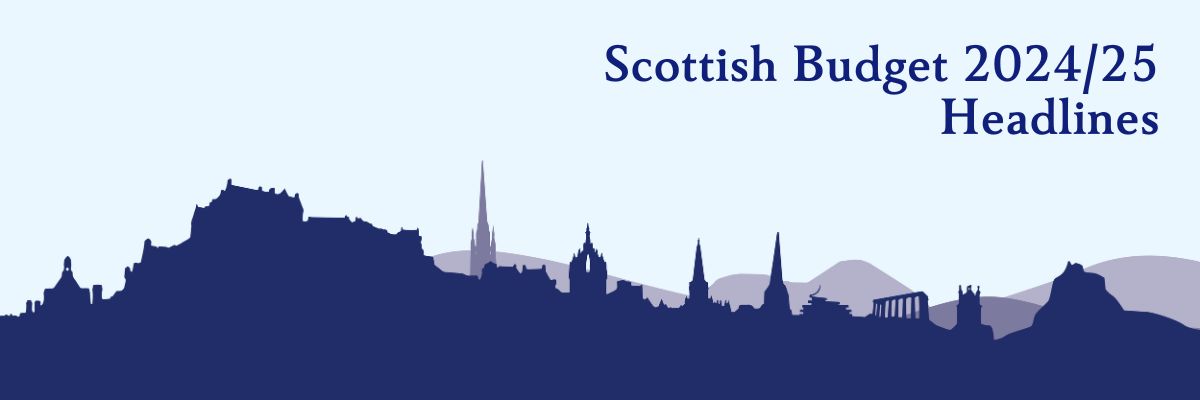Scottish Budget 2024/25

Information as of 19 December 2023
Shona Robison, the new Scottish Finance Secretary delivered her first Scottish Budget for 2024/25 yesterday. There was much speculation before yesterday’s budget as to how the deficit in the Scottish Government’s finances would be filled. The headline grabbing changes are a new tax band of 45% income tax for those earning more than £75,000, and an additional 1% on the “top rate” of tax, making a 48% tax rate (compared to 45% in the rest of the UK). For a Scottish resident employee earning between £100,000 and £125,140, it means a marginal rate of income tax and employee NICs of 69.5%. For those earning over £75,000, pension contributions will become all the more attractive. This is projected to raise an additional £82m in income tax.
There were limited other changes to the devolved taxes. There were no changes announced to Land and Buildings Transaction Tax and Scottish Landfill Tax rates will increase in line with inflation.
We have highlighted the points we believe are most relevant for our clients below. Should you want to read the full budget report it can be found here https://www.gov.scot/budget/ on the Scottish Government’s website.
Personal Taxes
Scottish Income Tax
As noted above, there is to be a new tax band for Scottish residents who pay the Scottish rate of income tax. The Scottish Government cannot amend the personal allowance, so this remains at the UK rate. The starting point for the starter rate band, the basic rate band and the intermediate rate band all increase in line with inflation. The starting point for the higher rate tax band is unchanged (at £43,663) and applies up to £75,000.
The new advanced rate then applies for those with income between £75,000 and £125,140. It should be noted that where an individual’s income exceeds £100,000 or more, they gradually lose their personal allowance. Scottish taxpayers with income between £100,000 and £125,140 will pay an effective tax rate of 67.5 per cent on this slice of their income, as the tax-free personal allowance is withdrawn. When employee NICs is added in, this marginal rate becomes 69.5%. The corresponding figures for the UK are 60 per cent (income tax) and 62 per cent (income tax and employee NICs). Higher earners in Scotland already pay more in income tax than elsewhere in the UK. With these changes, The Chartered Institute of Taxation have calculated that a Scottish resident paying the new Advanced Rate will pay between £1,871.13 and £5,231.81 more than someone on the same salary in other parts of the UK in 2024/25.
The top rate of tax of 48% applies for those with income above £125,140. When employee NICs is added in, this is a marginal rate of 50%.
It is important to note that only certain types of income are liable to the Scottish rate of income tax. It does not, for example, apply to interest and dividend income. For business owners, taking dividends may, once again, become more preferable to taking a salary. For those who are self-employed, or who operate through a partnership, it may be an opportune time to review your business structure.
The Scottish income tax bands and rates for 2024/25 are summarised in the table below
| Rate name | Income range | Rate |
| Starter rate | £12,571* – £14,876 | 19% |
| Basic rate | £14,877 – £26,561 | 20% |
| Intermediate rate | £26,562 – £43,662 | 21% |
| Higher rate | £43,663 – £75,000 | 42% |
| Advanced rate | £75,001 – £125,140 | 45% |
| Top rate | £125,140+ | 48% |
* assumes individuals are in receipt of the standard UK personal allowance.
Land and Buildings Transaction Tax (LBTT)
No changes to the LBTT rates or bands were announced. The rate of the Additional Dwelling Supplement (ADS) remains 6%.
It should be noted that since LBTT was introduced on 1 April 2015, the rates and bands for residential purchases (excluding the ADS) have all remained unaltered.
Business Taxes – non-domestic rates (business rates)
The Basic Property Rate of Non-Domestic Rates will be frozen at its current level of 49.8p. The Intermediate Property Rate and the Higher Property Rate are to increase by inflation (to 54.5p and 55.9p respectively).
A new business rates relief as announced for the hospitality sector in island communities, where 100% relief will be available capped at £110,000 per business.
Support will continue to encourage investment in renewable district heating networks by extending 90% renewables District Heating Relief until 31 March 2027.
District Heating Relief was extended until 31 March 2027. This is designed to support investment in renewable district heating networks.
Other Scottish Budget highlights
Local government sets council tax. The Scottish Budget states that the Scottish Government is committed to working with local government to freeze council tax in 2024/25 (however, that will be decided upon by each local council in due course).
The Scottish parliament has introduced a bill to legislate for a Scottish Aggregates Tax. If enacted, the new tax will take affect from 1 April 2026.
The Air Departure Tax remains a thorny issue and for now, the UK wide rates continue to apply.
As always, the information outlined above is for general guidance purposes only. We appreciate that every individual and business has different circumstances and you should always seek appropriate professional advice before you act on any of the information provided.
If you would like more information or advice on the budget or require wider business planning or financial guidance, please do get in touch with your GWA Partner. Alternatively, if you are not a GWA client please do contact us to arrange your free initial meeting.


